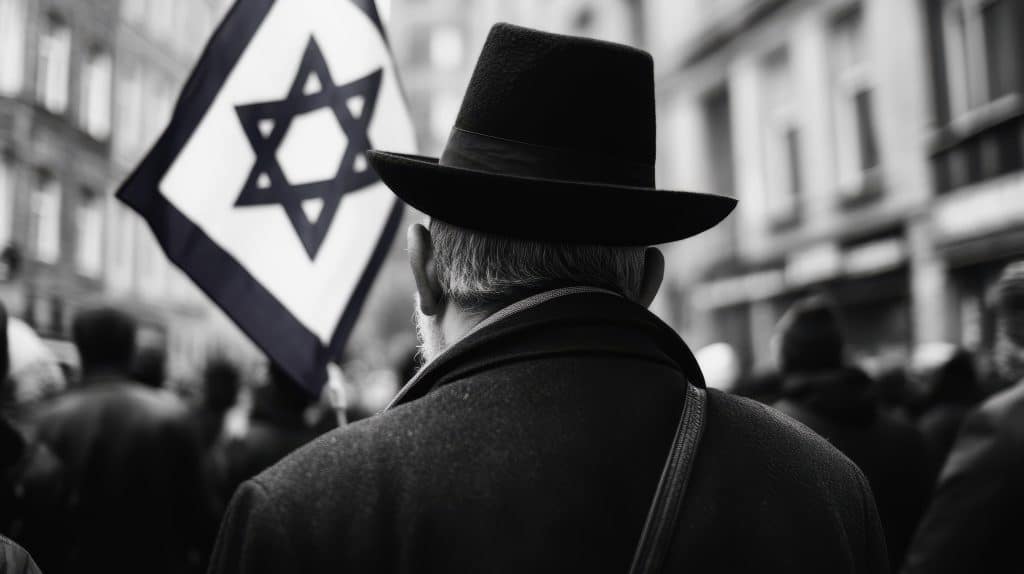Antisemitic hate crime Washington DC 2025

Anúncios

Antisemitic hate crimes in Washington DC are on the rise, casting a shadow over the safety and well-being of Jewish communities.
The recent surge in incidents, ranging from vandalism to violent assaults, underscores the urgency of addressing this issue.
Anúncios
These acts of hatred are more than isolated events; they ripple through neighborhoods, affecting everyone.
Antisemitic hate crime Washington DC calls for collective awareness, immediate action, and robust support systems for victims. Let’s explore the causes, effects, and ways to combat this troubling trend.
Understanding antisemitism
Understanding antisemitism is critical in combating the rising tide of antisemitic hate crimes that affect Jewish communities, particularly in areas like Washington DC.
Anúncios
Antisemitism is not just a historical problem; it is a pervasive form of discrimination that has continued to evolve, leading to harmful acts of prejudice and violence.
By understanding its origins, manifestations, and impact, we can take the necessary steps to combat antisemitic hate crimes and work towards a safer, more inclusive society.
What is Antisemitism?
Antisemitism refers to hostility, prejudice, or discrimination against Jewish individuals. This form of hate can manifest in many different ways, including:
- Social Exclusion: When Jewish individuals are shunned or ostracized from social groups or activities.
- Hate Speech: The use of offensive, derogatory language targeting Jewish people.
- Physical Violence: Attacks or threats made against Jewish individuals or their property, a direct form of antisemitic hate crime.
Recognizing these forms of discrimination is the first step toward eliminating antisemitic hate crimes. By understanding what antisemitism looks like, we are better equipped to address and prevent its harmful effects.
Historical Context of Antisemitism
The roots of antisemitism run deep, dating back to ancient times. Over the centuries, misconceptions and stereotypes about Jewish people have been used to justify violence, exclusion, and discrimination.
the Middle Ages, harmful ideas like the blood libel and false accusations of Jewish responsibility for the death of Jesus Christ fueled widespread violence and societal rejection.
In modern times, antisemitism has adapted, often appearing in the form of conspiracy theories or generalizations that target Jewish communities.
Understanding these historical shifts is crucial in addressing how antisemitic hate crimes continue to evolve today.
Forms of Antisemitism
Antisemitism can take many forms, each with distinct consequences for Jewish individuals and communities. These include:
- Institutional Antisemitism: When organizations, governments, or other entities create or enforce policies that discriminate against Jewish individuals.
- Social Antisemitism: When antisemitic behavior is perpetuated within social circles, often in the form of exclusion, slurs, or stereotypes that marginalize Jewish people.
- Cultural Antisemitism: Depictions in the media and popular culture that perpetuate negative and harmful stereotypes about Jewish individuals.
- Physical Antisemitism: This is the most violent form of antisemitism, involving direct acts of violence, threats, or intimidation against Jewish individuals or Jewish-owned properties, often leading to antisemitic hate crimes.
Each form of antisemitism is harmful, not only to those directly targeted but to the broader community as well.
Antisemitic hate crimes can create an environment of fear and mistrust, eroding the foundation of inclusivity and safety within neighborhoods.
Criticism of Israel vs. Antisemitism
It is essential to differentiate between criticism of the state of Israel and antisemitism.
While it is legitimate to criticize the policies or actions of any government, including Israel, antisemitic hate crimes arise when criticism crosses the line into questioning the legitimacy of Jewish identity or existence.
Criticism that dehumanizes or delegitimizes Jews as a people is antisemitic, not merely political disagreement.
Combating Antisemitism
Combating antisemitic hate crime Washington DC requires a multifaceted approach. Education plays a vital role in raising awareness about the history of antisemitism and its contemporary implications.
Through community programs that foster understanding, we can break down stereotypes and build empathy. These initiatives promote inclusivity, helping to create an environment where discrimination of any kind is rejected.
In addition, legislation is critical in addressing antisemitic hate crimes. Laws must be enacted to protect victims of hate and ensure that antisemitic acts are taken seriously within the judicial system.
Stronger policies and support systems will help deter hate crimes and assist those who have been targeted.
By acknowledging the deep roots and continued evolution of antisemitism, we can work together to build a safer, more inclusive society where antisemitic hate crimes are no longer tolerated.
Education, policy change, and community engagement will help ensure that the Jewish community, and all marginalized groups, can thrive without fear of discrimination or violence.
Recent antisemitic incidents in Washington DC
The rise in antisemitic hate crime Washington DC has raised alarms within the city, with many concerned about the growing threat to Jewish communities.
These antisemitic hate crimes highlight the urgent need for both awareness and action to combat antisemitism.
As incidents of antisemitic hate crime Washington DC increase, it’s evident that this issue is not isolated, and the safety of Jewish individuals is at stake.
The rise in such crimes is a reflection of broader societal challenges that demand immediate attention.
Addressing antisemitic hate crime Washington DC is not just about protecting Jewish communities but also ensuring that hatred in all forms has no place in a diverse society.
Overview of Incidents
Over the past several years, antisemitic hate crimes Washington DC have become increasingly prevalent, manifesting in a variety of harmful forms.
Vandalism, hate speech, and threats are among the most common acts of antisemitism that have been reported.
These actions not only harm individuals but also undermine the trust that binds communities together.
The rise in antisemitic hate crime Washington DC is an indicator of a deeper societal issue, one that requires collective action to address.
It is crucial to understand that these incidents affect the whole community, as the ripple effects extend far beyond the victims.
Notable Cases
Here are some significant incidents that have occurred:
- Graffiti Attacks: In various neighborhoods, antisemitic graffiti has been found on buildings and public spaces.
- Physical Assaults: There have been instances where individuals were assaulted because of their Jewish identity.
- Threatening Messages: Community centers and synagogues received threatening emails or phone calls, causing fear among members.
- Online Harassment: Social media platforms have seen a rise in antisemitic comments and threats directed towards local Jewish leaders.
These incidents can create an atmosphere of fear and isolation. When communities witness such actions, it can undermine their sense of belonging.
It is essential to recognize that these acts are not isolated; they often connect to broader social issues.
Combating these incidents requires collective efforts. Local authorities, communities, and advocacy groups must work together to promote understanding and respect.
Community outreach can foster dialogue, educate individuals about antisemitism, and strengthen bonds among diverse populations.
The Role of Law Enforcement
It is significant for law enforcement to take these incidents seriously. Tracking and reporting these crimes can help in identifying patterns and preventing future occurrences.
Collaborative training for police on how to respond to hate crimes can streamline more effective interventions.
Furthermore, community vigilance plays a critical role.
Individuals should report any suspicious activity or hate crimes to the authorities. Awareness and vigilance can help create safer environments for everyone.
The impact of hate crimes on communities

The consequences of hate crimes on communities extend far beyond the immediate harm caused to victims. These acts of violence, discrimination, and prejudice ripple through neighborhoods, affecting everyone in their wake.
Hate crimes create a climate of fear, tension, and division, undermining the fundamental sense of safety and belonging that is essential to any community.
As antisemitic hate crimes Washington DC and other forms of hate crimes increase, it becomes clear that their effects are deeply felt across social, emotional, and economic aspects of society.
Emotional and Psychological Effects
Victims of hate crimes often experience a range of emotional and psychological effects. Many feel fear, anxiety, and isolation after being targeted.
This can lead to broader community anxiety, making individuals reluctant to participate in public life. When people feel unsafe, it alters their daily routines and interactions.
Community Trust and Cohesion
Hate crimes can also erode trust within communities. When one group is targeted, it sends a message of vulnerability that can affect others, fostering an atmosphere of distrust.
This can fracture community ties and reduce collaboration among different groups. It is essential for communities to respond to hate crimes with solidarity to restore trust and cohesion.
- Fear of Attacks: People may become overly cautious, limiting their movements and social interactions.
- Stigmatization: Whole groups may feel stigmatized and marginalized, impacting their integration.
- Community Division: Tensions can rise between different community groups, leading to conflict.
- Lack of Participation: Reduced engagement in community activities and local governance.
The psychological and social effects of hate crimes can lead to long-lasting changes in how communities interact with local law enforcement and government agencies.
Survivors of hate crimes may feel that their voices are ignored, making them hesitant to report future incidents.
This lack of trust can hinder the reporting of crimes, leaving antisemitic hate crimes Washington DC and other types of hate crimes underreported and unaddressed.
Economic Impact
The economic effects of hate crimes are often overlooked, but they can be just as damaging as the social and psychological toll.
Communities affected by antisemitic hate crimes Washington DC may see a decline in business activity.
When an area is perceived as unsafe, both tourists and new residents are likely to avoid it, leading to decreased foot traffic and lower economic activity.
This impacts local businesses, making it harder for them to thrive and for communities to prosper.
The economic fallout from hate crimes can be particularly devastating in diverse and inclusive communities, where economic activities are tied to a sense of unity and security.
As businesses close or downsize due to diminished foot traffic and consumer fear, job opportunities and local economic growth stagnate.
Addressing hate crimes is not just about protecting individuals, it’s also essential for safeguarding the community’s economic health and long-term stability.
How to respond to antisemitic hate crimes
Knowing how to respond to antisemitic hate crimes Washington DC is essential for fostering a sense of community solidarity and ensuring the safety of all residents.
Immediate and thoughtful responses can make a significant difference in addressing the harm caused by these crimes and in preventing further incidents.
A coordinated and compassionate approach can empower victims, help prevent the escalation of hate, and restore trust within the community.
Understanding how to respond effectively is a crucial step in combatting antisemitism and promoting inclusivity.
Report the Incident
The very first step in responding to antisemitic hate crimes Washington DC is to report the crime to the appropriate authorities.
This includes local law enforcement and any relevant community organizations dedicated to antisemitic hate crime prevention.
By reporting these incidents promptly, the community can raise awareness about the problem and take immediate action.
Reporting helps ensure that these crimes are documented, investigated, and addressed, allowing law enforcement to identify patterns and take preventive measures.
Reporting incidents not only aids in legal action but also sends a message that antisemitic hate crimes will not be tolerated. It also helps community organizations mobilize resources and support for victims.
The more these crimes are reported, the stronger the response becomes.
Support the Victims
Providing support for the victims is crucial. Offer emotional support and resources to those affected. Support can come from friends, family, or community support groups that specialize in helping victims of hate crimes.
- Connect with Local Organizations: Help victims connect with local advocacy groups.
- Offer Counseling Services: Professional therapy can assist victims in healing.
- Organize Community Support: Hold community meetings to discuss and address incidents.
- Encourage Dialogue: Promote conversations about hate and discrimination within the community.
These actions can empower victims and show them they are not alone.
Engage the Community
Promoting community engagement is another vital component of responding to antisemitic hate crimes Washington DC.
It is essential to educate and involve the broader community in understanding the severity of these crimes and how to address them.
Educational workshops and community events can help individuals recognize antisemitism and other forms of hate crimes, as well as learn how to respond appropriately.
Community leaders play a crucial role in organizing these events. They can:
- Help organize awareness campaigns that focus on the impact of hate crimes and how these acts damage the community as a whole.
- Promote diversity and inclusivity through events that celebrate cultural differences and encourage positive interactions among diverse groups.
- Create a sense of belonging by encouraging people from different backgrounds to share their experiences and learn from one another.
By engaging the community in these activities, individuals can form a united front against antisemitic hate crimes Washington DC, and the collective strength of the community will help deter future acts of hatred.
Advocacy and Policy Change
Another important aspect of responding to antisemitic hate crimes Washington DC is advocacy and pushing for policy change.
Advocacy efforts can help create a safer environment by promoting stronger protections for victims of hate crimes.
Engaging with local policymakers to strengthen hate crime laws and improve victim protections is essential in preventing further violence and ensuring that these crimes are prosecuted effectively.
Additionally, working with educational institutions to incorporate anti-bullying and anti-discrimination programs into school curricula is a crucial preventative measure.
Education is one of the most powerful tools in combating hate, as it lays the foundation for understanding, tolerance, and acceptance from an early age.
This kind of education can help prevent antisemitic hate crimes Washington DC by fostering an environment of respect and empathy.
Through advocacy and policy change, we can ensure that antisemitic hate crimes are met with firm legal consequences and preventative measures.
By collaborating with lawmakers, schools, and community leaders, society can work toward a future where hate has no place.
Preventative measures against hate crimes
Implementing preventative measures against hate crimes is vital for fostering safe, inclusive, and resilient communities.
Proactive strategies are not just about responding to incidents after they occur, they focus on preventing these crimes from happening in the first place.
By addressing the root causes of hate crimes, such as prejudice, ignorance, and division, we can significantly reduce the likelihood of these harmful acts occurring.
Communities that work together to combat antisemitic hate crimes Washington DC and other forms of hatred create environments where individuals feel valued, safe, and accepted.
Education and Awareness Programs
Education is one of the most effective tools for preventing hate crimes.
When individuals are educated about the value of diversity, tolerance, and respect, it becomes harder for antisemitic hate crimes and other forms of discrimination to take root.
Schools, community organizations, and local institutions must develop programs that teach the importance of understanding and respecting all individuals, regardless of their background.
Community Engagement
Building strong relationships within the community can also act as a deterrent. Community events that foster connection among diverse groups lay the foundation for mutual understanding. Engaging local leaders and influencers to support inclusivity promotes a culture of acceptance.
- Workshops: Organizing workshops on understanding different cultures and communities.
- Social Events: Hosting social events that celebrate diversity can foster relationships.
- Partnerships: Collaborating with local organizations that focus on anti-discrimination efforts.
- Support Networks: Creating support networks for victims and those impacted by hate.
These initiatives can empower individuals to speak out against hate and promote a sense of belonging.
Monitoring and Reporting Mechanisms
Establishing clear channels for reporting hate crimes encourages victims to come forward. Communities can create anonymous reporting systems and ensure that law enforcement responds appropriately to reports.
Transparency in how incidents are handled builds trust.
Training for Law Enforcement is another critical measure. Police departments should receive training focused on recognizing and responding to hate crimes effectively.
When officers understand the community’s specific needs, they can better protect individuals.
Legislation and Policy Support
Advocating for legislation that protects against hate crimes is also vital. Local governments can work to strengthen laws that address hate crimes and offer support services for victims.
Having clear policies sends a strong message about the unacceptability of hate.
Collaboration between community members and officials can ensure that preventative measures are in place and that they effectively address the concerns of those directly affected by hate crimes.
Community resources and support systems

Access to community resources and support systems is crucial for individuals affected by hate crimes, including antisemitic hate crimes Washington DC.
These resources provide the guidance, advocacy, and emotional assistance that victims need to navigate challenging times.
With the right support, victims can regain their sense of safety, seek justice, and begin the healing process.
Communities that prioritize support systems play a key role in preventing further harm and creating a resilient environment where individuals can feel empowered and supported.
Local Support Organizations
Local organizations are often the first line of defense for individuals affected by hate crimes. These groups offer a range of services that can help victims feel less isolated and more empowered to seek justice.
They provide emotional support, legal assistance, and safe spaces for individuals to share their experiences.
- Emotional Support: Many organizations offer counseling services or peer support groups where victims can express their feelings and gain comfort from others who have experienced similar traumas.
- Legal Assistance: Local organizations can connect victims with legal professionals who specialize in hate crimes and can guide them through the legal process.
- Safe Spaces: These organizations often provide confidential environments where individuals can speak freely without fear of further harm or discrimination.
Connecting with these organizations not only offers practical help but also helps victims feel a sense of solidarity, knowing that they are supported by their community.
Helplines and Hotlines
Helplines are vital resources for immediate assistance. They offer a place for victims to speak with trained professionals who can help them navigate their feelings and legal options.
Many hotlines are available 24/7, providing confidential support whenever it is needed.
- National Domestic Violence Hotline: Provides resources and support for those experiencing violence.
- Anti-Defamation League: Offers resources for victims of antisemitic hate crimes.
- Local Crisis Centers: Many cities have crisis centers dedicated to helping individuals in distress.
- Support Groups: Encouraging peer support through organized meetings can foster healing.
These helplines can connect victims with additional resources such as counseling and legal aid.
Educational Programs
Communities often have educational programs aimed at raising awareness about hate crimes.
These programs provide information about reporting incidents, understanding rights, and accessing support. Schools also play a role in educating students about tolerance and acceptance.
Having workshops on topics related to discrimination and prejudice can build understanding within communities.
Training sessions for teachers, law enforcement, and community leaders help spread awareness and promote a culture of inclusivity.
Legal Aid Resources
Legal aid organizations provide essential services for victims seeking justice.
They offer guidance on legal rights and resources for filing reports, pursuing protective orders, or seeking restitution. Access to free or low-cost legal assistance helps ensure victims can navigate the legal system effectively.
Finding local legal aid resources can empower victims to take action against perpetrators and seek necessary protections. Working closely with legal professionals familiar with hate crimes can increase the likelihood of a fair resolution.
In conclusion, addressing antisemitic hate crimes requires a collective effort from individuals, communities, and authorities.
By understanding the impact of these crimes, we can build stronger support systems and promote awareness.
Accessing resources and engaging in preventative measures can help create safer environments for everyone. Together, we can foster communities that are inclusive and resilient against hate.
The rise of antisemitic hate crime Washington DC is a deeply troubling issue that demands our immediate attention.
These heinous acts not only inflict direct harm on Jewish individuals but also have a far-reaching impact on communities as a whole.
Antisemitic hate crime Washington DC is not just a problem for those directly targeted, but a threat to the social fabric of the city, eroding trust and unity among its diverse populations.
As these crimes continue to rise, it is crucial for all of us to take a stand, whether through education, community engagement, or direct action.
By fostering stronger communities, supporting victims, and implementing preventative measures, we can work together to reduce the occurrence of antisemitic hate crime Washington DC.
Education, awareness, and unity are our most powerful tools in combating these acts of hatred.
It is imperative that we continue to build a society where antisemitic hate crimes are not tolerated, and where everyone, regardless of their background, can live without fear of discrimination or violence.
Through reporting incidents, engaging with local organizations, and advocating for stronger legislation, we can make a significant difference.
Let us come together to fight for a safer, more inclusive environment, and ensure that antisemitic hate crimes are no longer a part of our daily reality.
Together, we can eradicate these harmful acts and work towards a future where tolerance and respect for all individuals are the norm.
For more information on how antisemitic hate crime Washington DC is being addressed, you can explore these valuable resources:
FAQ – Frequently Asked Questions about Antisemitic Hate Crimes
What should I do if I witness an antisemitic hate crime?
If you witness an antisemitic hate crime, it’s important to report it to local authorities immediately and provide as much information as possible.
How can community resources help victims of hate crimes?
Community resources can provide emotional support, legal guidance, and help victims connect with advocacy groups for assistance.
What preventative measures can be taken to reduce hate crimes?
Preventative measures include education and awareness programs, community engagement activities, and establishing clear reporting mechanisms for hate crimes.
How can I get involved in supporting victims of hate crimes?
You can get involved by volunteering with local organizations, attending community events that promote inclusivity, and advocating for policies that protect against hate.
Liked the article?





